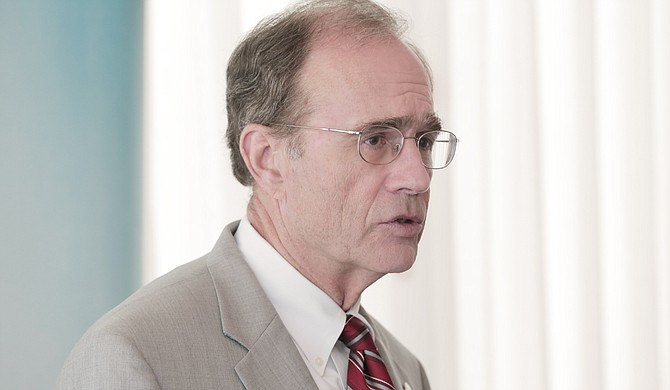Secretary of State Delbert Hosemann’s election-law reform bills are largely still alive and sitting at the Senate’s feet for approval in the coming weeks. Photo by Imani Khayyam.
Sen. Chris McDaniel, R-Ellisville, adamantly believes that Mississippi's campaign-finance laws are not strong enough. He believes that personal use of campaign funds is inappropriate and has offered amendments this session to prove it.
"Money has a corrupting impact on politics," he said in an interview.
The Mississippi Legislature, at least so far, is showing more willingness to regulate campaign and election practices than at anytime in its history. On March 3, the Senate passed a campaign finance credit-card itemization bill, which would force legislators to specify what they are buying with those credit cards—instead of just writing an expense off as "$359 MasterCard," for example.
McDaniel offered an amendment to the bill, which would have prevented lawmakers from using campaign-finance dollars for personal use, long a rampant and known practice in the state.
The amendment would have defined "personal use" as residential or household items, mortgages, clothing, automobile expenses, tuition payments or member and admission dues to clubs or sporting events. The amendment was ruled "not germane" because the credit-card itemization bill dealt with the reporting of expenditures, not with the way money can be spent, Lt. Gov. Tate Reeves told the Senate.
Reeves also reiterated, in a statement to the Jackson Free Press, that his campaign account is not used on personal spending.
"I personally ensure my campaign account is not used on personal spending, and I believe it meets every guideline in the amendment Sen. McDaniel offered. I would not oppose amending the election code in a similar fashion to Sen. McDaniel's amendment; however, on advice of counsel, the proposal was not properly before the Senate," Reeves said.
Election Reform Bills In Senate
McDaniel may have another chance to try his personal-use amendment. Secretary of State Delbert Hosemann sponsored a wide-ranging election-reform bill that the House Apportionment and Elections Committee pared down to several smaller bills, which all passed through the House earlier this month.
House Bill 809 would allow and define online voter registration, so first-time voters could register online and already registered voters could update address or personal information online. House Bill 796 would clarify pre-Election Day voting and absentee voting procedures. Pre-Election Day voting would begin two weeks before election day if the bill becomes law and would eliminate in-person absentee voting. House Bill 866 would introduce a $3,000 fine for election crimes (instead of just having jail and penitentiary options) for electors, managers, clerks or canvassers who offer money or rewards to influence voters. House Bill 797, which was originally 800 pages long, was shortened and would implement poll manager training programs and reduce the number of paper ballots printed to save money and paper.
After the House passed the election-reform bills that encompass all the changes Hosemann wanted, he released a statement praising lawmakers.
"We are so pleased with the bipartisan vote," Hosemann said. "Today, Mississippi turned a 125-year-old page in our history because we trust each other."
The Secretary has supported, and advocated for election-law reform, and last year he formed a committee of lawmakers, election commissioners and circuit clerks from both sides of the political aisle to discuss and eventually propose changes to the state's election code.
Hosemann's committee met over the summer and fall last year, and the result was a lengthy report, published in January, which turned into several pieces of legislation come session time.
If Hosemann's reform bills are going to become law, the Senate must pass them through committee in the coming weeks.
Much of the legislation will bring Mississippi's outdated election code into line with other states. It will also push the state forward on several issues. If House Bill 809 passes, Mississippi will join 26 other states that use online voter registration. With help from the Department of Public Safety, online voter registration will be available to all Mississippi voters.
Sen. David Blount, D-Jackson, who served on Hosemann's committee, told the Jackson Free Press last month that he has been working to introduce online voter registration for several years in the Legislature.
"I believe that every citizen has to freely be able to exercise their Constitutional right to vote," Blount said last month. "We ought to make it freer and easier for people's right to vote."
Email reporter Arielle Dreher at arielle@jacksonfreepress.com.



Comments
Use the comment form below to begin a discussion about this content.